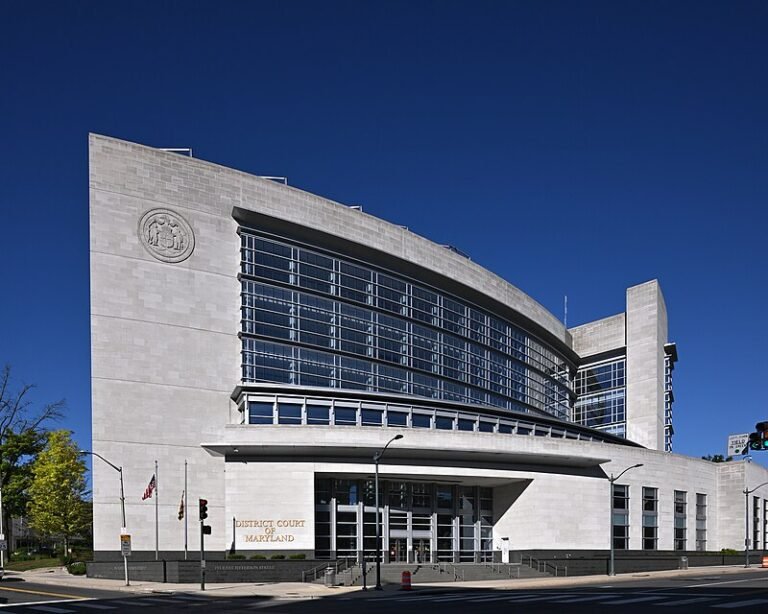Maryland federal court plays a crucial role in the administration of justice for federal matters within the state of Maryland. As part of the United States federal judiciary system, this court handles a wide range of legal issues involving federal laws, including civil disputes, criminal prosecutions, and immigration cases. The court serves as the primary trial-level venue for federal cases arising in Maryland, ensuring that federal statutes and constitutional rights are upheld.
The United States District Court for the District of Maryland is the official name of the Maryland federal court. This court has jurisdiction over the entire state and operates mainly from two locations: Baltimore and Greenbelt. Baltimore is Maryland’s largest city and hosts many court proceedings, while Greenbelt is located closer to the nation’s capital, Washington, D.C., serving residents in the central and southern parts of the state. These courtrooms accommodate a diverse caseload, reflecting Maryland’s population and its role in regional and national legal matters.
Maryland federal court is responsible for hearing cases that involve federal law or the United States government. This includes civil cases such as disputes involving federal regulations, constitutional claims, civil rights, and employment law. Criminal cases under federal statutes, including drug offenses, white-collar crimes, and organized crime, are also prosecuted here. A significant portion of the court’s docket involves immigration cases, where the court reviews decisions related to deportation, asylum, and other immigration benefits. This makes the court a key venue for challenges to immigration enforcement and policy decisions affecting individuals living in Maryland.
The judges in the Maryland federal court are appointed by the President of the United States and confirmed by the Senate. These lifetime-appointed judges carry the responsibility of presiding over trials, ruling on motions, and ensuring fair application of the law. Additionally, magistrate judges assist the court by handling pretrial matters, discovery disputes, and sometimes overseeing preliminary hearings in criminal cases. The presence of experienced judges helps maintain the integrity of the judicial process and upholds the principles of justice.
When a party is dissatisfied with a decision made in Maryland federal court, they can appeal to the United States Court of Appeals for the Fourth Circuit. This appellate court oversees federal courts in Maryland, Virginia, West Virginia, North Carolina, and South Carolina. The Fourth Circuit reviews the trial court’s decisions for legal errors and determines whether to uphold or reverse them. Cases that involve significant legal questions or constitutional issues may further be appealed to the United States Supreme Court, the highest court in the nation.
Maryland federal court has gained attention in recent years for its involvement in immigration-related lawsuits. Many individuals who face deportation or detention in Maryland turn to this court to challenge decisions made by federal immigration agencies. The court is empowered to review whether government actions comply with federal law and constitutional protections. Cases filed here often highlight broader concerns about immigration enforcement practices and detainee treatment, making the court a significant arena for human rights and immigration policy debates.
The court’s role extends beyond immigration to include enforcement of other federal laws and regulations. It handles cases that affect business practices, environmental regulations, intellectual property, and civil liberties. Maryland federal court contributes to the development of federal law by issuing rulings that interpret statutes and legal precedents. These decisions influence not only Maryland residents but can also impact the interpretation of federal law across the country.
In the context of recent high-profile cases, Maryland federal court has served as a platform for challenging federal government actions. For example, cases involving individuals who were mistakenly deported or whose rights were violated during immigration enforcement have been filed here. These cases often bring public scrutiny and legislative interest, leading to calls for policy reforms and increased oversight of federal agencies. Maryland’s federal court thus acts as a safeguard, holding government authorities accountable and providing a forum for redress.
The accessibility of Maryland federal court to residents and attorneys across the state is enhanced by its dual locations and structured procedures. Cases are filed according to federal rules of civil and criminal procedure, ensuring consistency and fairness. The court provides resources for self-represented litigants and supports public access to hearings and records. This transparency helps maintain public trust in the judicial system.
Maryland federal court remains an essential institution for enforcing federal laws and protecting individual rights within the state. Its decisions shape the legal landscape in Maryland and contribute to the broader federal judiciary system. As federal laws evolve and new legal challenges arise, Maryland federal court will continue to play a vital role in delivering justice and upholding the rule of law.







